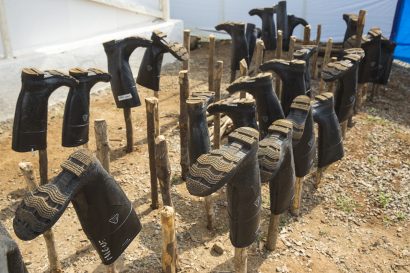Tag: Health Service Delivery
DFID committed 12 million GBP to uplift frontline health workers’ salaries in Sierra Leone from 2010 to 2015 to support the implementation of the Free Healthcare Initiative (FHCI), launched in April 2010, which made health services free for pregnant women, children under five years of age and nursing mothers. Increasing the availability of frontline health… Read more
Tim Martineau is a Senior Lecturer in Human Resource Management (HRM) at the Liverpool School of Tropical Medicine and leads a growing team working on health workforce issues. In this video, he talks about the Health Systems in Fragile and Conflict-Affected States Working Group, a subgroup of Health Systems Global which is a society for… Read more
Barbara McPake is a health economist specialising in health policy and health systems research. She is one of two Research Directors of ReBUILD, a UK Department for International Development funded Research Programme Consortium on health systems development. In this video, she talks about the consortium’s work in building resilient and responsive health systems in conflict-affected states. ReBUILD… Read more
In this presentation Barbara McPake, the Research Director of ReBUILD, talks about Ebola in the context of conflict-affected states and health systems with a focus on West Africa – in particular comparing responses to Ebola outbreaks in Northern Uganda and Sierra Leone. The ReBUILD Consortium is a research partnership funded by the UK Department for… Read more
Abstract Background: Annually over 520,000 newborns die from neonatal sepsis, and 60,000 more from tetanus. Estimates of the effect of clean birth and postnatal care practices are required for evidence-based program planning. Objective: To review the evidence for clean birth and postnatal care practices and estimate the effect on neonatal mortality from sepsis and tetanus… Read more
Beginning in October 2012, five donors (Australia, Canada, the European Union, Sweden and the UK) are providing £120 million through the Health Pooled Fund (HPF) for a programme in South Sudan lasting three and a half years. The UK leads and manages the HPF on behalf of other contributing donors. The programme supports the delivery… Read more
There is evidence to show that community participation and accountability in health service delivery and health care leads to improved health outcomes within that community. This review gives definitions of the key concepts and a history of community participation and accountability in section 2. The experience of pilot programmes suggests that community mobilisation can bring… Read more
Minimum standards in healthcare are often referred to in documents but not expanded on in detail. This report covers the few documents that were found within the scope of this study that expanded on standards for healthcare. A document outlined on minimum service delivery standards in primary and secondary healthcare in Punjab is outlined in… Read more
HLSP REPORT:This paper aims to provide an overview of the debates about how much is needed to achieve the health MDGs, how such funds might be raised, and some of the implications of scaling up, with a particular focus on the potential impact on macroeconomic stability.
HRC REPORT: This report synthesises written submissions to DFID collected in July 2006 via a public consultation process. The report identifies gaps in the response to health challenges, key areas to be strengthened and outlines how health architecture can be improved to deliver better health for the poor.
HRC REPORT: This report considers if user fees for health services should be removed and reviews the experiences of countries that have gone down this route. It also provides an overview of the history of ‘user fee’ implementation in Sub-saharan Africa, and analyses the effect of ‘user fee’ charges using a ‘business model’ framework.

